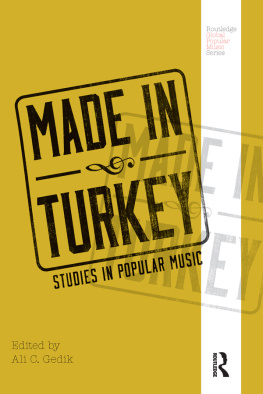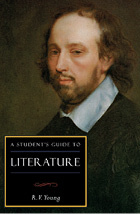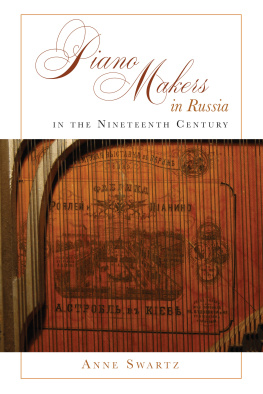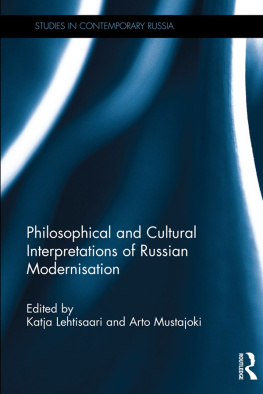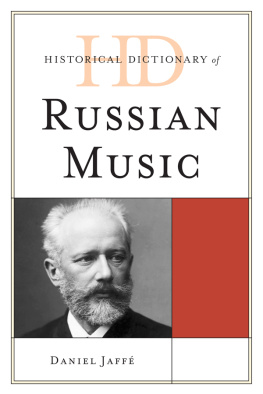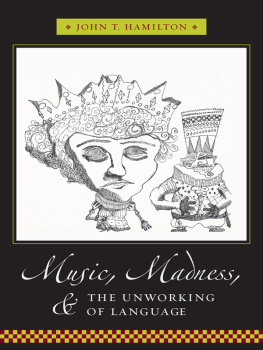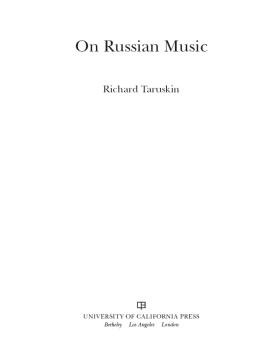History of Music
in Russia from
Antiquity to 1800

Nikolai Findeizen (18681928).
History of Music
in Russia from
Antiquity to 1800
VOLUME 1
From Antiquity to the Beginning
of the Eighteenth Century
VOLUME 2
The Eighteenth Century
This work was brought to publication with
the generous support of
Joseph Bloch.
RUSSIAN MUSIC STUDIES
Malcolm Hamrick Brown, founding editor
History of Music
in Russia from
Antiquity to 1800
VOLUME 1
From Antiquity to the Beginning
of the Eighteenth Century

Nikolai Findeizen
TRANSLATION BY
Samuel William Pring
EDITED AND ANNOTATED BY
Milo Velimirovi and Claudia R. Jensen
WITH THE ASSISTANCE OF
MALCOLM HAMRICK BROWN AND
DANIEL C. WAUGH

This book is a publication of
Indiana University Press
601 North Morton Street
Bloomington, IN 47404-3797 USA
http://iupress.indiana.edu
Telephone orders | 800-842-6796 |
Fax orders | 812-855-7931 |
Orders by e-mail |
2008 by Indiana University Press
All rights reserved
No part of this book may be reproduced or utilized in any form or by any means, electronic or mechanical, including photocopying and recording, or by any information storage and retrieval system, without permission in writing from the publisher. The Association of American University Presses Resolution on Permissions constitutes the only exception to this prohibition.
The paper used in this publication meets the minimum requirements of American National Standard for Information SciencesPermanence of Paper for Printed Library Materials, ANSI Z39.48-1984.
Manufactured in the United States of America
Library of Congress Cataloging-in-Publication Data
Findeizen, N. F. (Nikolai Fedorovich), 18681928.
[Ocherki po istorii muzyki v Rossii. English]
History of music in Russia from antiquity to 1800 / Nikolai Findeizen ; translation by Samuel William Pring ; edited and annotated by Milo Velimirovi and Claudia R. Jensen with the assistance of Malcolm Hamrick Brown and Daniel C. Waugh.
v. cm. (Russian music studies)
Includes bibliographical references and index.
Contents: Vol. 1. From antiquity to the beginning of the eighteenth century. Introduction. The predecessors of the Slavs ; Pagan Rus ; Kievan Rus ; Novgorod the Great ; The activities of the Skomorokhi in Russia ; Music and musical instruments in Russian miniatures, woodcuts, and glossaries ; A survey of old Russian folk instruments ; Music in ancient Moscow (fifteenth and sixteenth centuries) ; Music in the monastery. Chashi (toasts). Bell ringing. Sacred performances (sixteenth and seventeenth centuries) ; Music in court life in the seventeenth century ; A brief survey of singers, composers, and music theorists of the sixteenth and seventeeth centuries ; Music and theater in the age of Peter the Great Vol. 2. The eighteenth century. Music and theater, 17301740 ; Music in court life during the reigns of Elizabeth Petrovna and Catherine II ; Music in Russias domestic life during the second half of the eighteenth century ; The Russian horn band ; Music in Russian public life during the second half of the eighteenth century ; Musical creativity in Russia during the eighteenth century ; Literature about music, publishers and sellers of sheet music, instrument makers and merchants.
ISBN-13: 978-0-253-34825-8 (v. 1 : cloth : alk. paper)
ISBN-13: 978-0-253-34826-5 (v. 2 : cloth : alk. paper) 1. MusicRussiaHistory and criticism. I. Pring, Samuel William. II. Velimirovi, Milo. III. Jensen, Claudia Rae. IV. Title.
ML300.F413 2008
780.947dc22
2006037057
1 2 3 4 5 13 12 11 10 09 08
Book layout and composition: Alcorn Publication Design
These volumes are dedicated, with our thanks, to Joseph Bloch and to Elizabeth (from M.V.) and to Brad, Anna, and Becky (from C.R.J.) for their support and patience throughout.

Contents
Editors Introduction to Volume 1
This work is a complete translation of Nikolai Findeizens Ocherki po istorii muzyki v Rossii (1928), a pathbreaking work which, in its scope and command of primary sources, and in its curiosity and generosity of scholarly inquiry, has remained a cornerstone for all subsequent studies of Russian music. A project of this nature is a collaboration from the outset. Findeizen, throughout his voluminous, even legendary, notes offers gracious thanks to the many scholars who contributed to his work, and it is a pleasure for us, the joint editors of this volume, to do the same. We must acknowledge, first and foremost, the heroic work of the original translator, Samuel William Pring, whose efforts and solutions to the many difficulties in this text were truly inspiring; our later work was in the nature of a dialogue not only with Findeizen but also with Pring, who managed to retain the authors own voice and spirit in his translation. Our work was also made possible by the farsighted generosity, patience, and skill of an important group of people who realized the importance of Findeizens and Prings labors and who made it possible to bring them to light. Our deepest gratitude goes to Joseph Bloch, who not only understood the importance of Findeizens work but was willing to grant the financial support necessary to publish this English translation. We owe him many thanks for his foresight and generosity, and we dedicate this edition to him. We owe Malcolm Brown, editor of the Russian Music Series at Indiana University Press, unending thanks for his advice, timely prodding, and boundless patience. He was willing to discuss any passage, to ponder every thicket of translation, and, quite simply, his efforts made this project possible. Daniel C. Waugh, of the University of Washington, contributed to almost every page of this work, and his efforts in identifying manuscripts and puzzling out chronicle references gave this edition the same kind of scholarly rigor he has demonstrated throughout his career; we offer him our profound thanks. Finally, the editors at Indiana University Press have also given us nothing but patience and encouragement in our work on this difficult and complex text, and our thanks go to Janet Rabinowitch and her predecessor, Jeffrey Ankrom, the most supportive and tolerant editors we can imagine. We also wish to thank Rita Bernhard for her thoughtful and insightful work as copyeditor on this enormous project.
Although the editorial responsibilities for this volume rest with us, many scholars have given generously of their time and expertise, and it is a pleasure to acknowledge their contributions. We have tested the patience and generosity of Gregory Myers time and time again; his work on the most difficult passages of this volume and his willingness to answer voluminous e-mail messages on details of medieval Russian syntax put us greatly in his debt. Elena Dubinets has spent countless hours pouring over the text, patiently explaining subtleties of grammar and pronunciation; the work would not have been possible without her help. Dan Newton, of the University of Washington, has also invested many hours in solving riddles of translation, rendering a sometimes dense Russian prose into lucid English with cheerfulness and the requisite patience. Many have shared their knowledge of Russian music and Russian culture in our work on this far-ranging text, and to Olga Dolskaya, of the Conservatory at the University of Kansas, Missouri, and to Galina Averina, our thanks can be expressed only inadequately for the time and advice they have so willingly given. Jack Haney, of the University of Washington, contributed greatly to our work on the . We also thank the University of Washington Department of Slavic Languages and the School of Music for their support of this project.
Next page

